Last year, I took part in a meeting attended by Cardinal Giuseppe Betori, the archbishop of Florence, about a “Pastoral Care of Inclusion,” an effort to include LGBTQ people and their families in the life of the church.
At the origin of this “pastoral care of inclusion” is the perspective of Pope Francis, well highlighted in his encyclical Evangelii Gaudium: a pastoral approach understood as the journey of a community that gathers so many diversities, frailties and difficulties, toward a common ideal of fullness, one toward which all walk, even if no one fully reaches it.
This pastoral vision stands opposed to a “customs” kind of pastoral care, whereby only those who fulfill the minimum requirements specified by the moral law can enter an exclusive club of Catholics.
This pastoral vision stands opposed to a “customs” pastoral care, whereby only those who fulfill the minimum requirements specified by the moral law can enter an exclusive club of Catholics.
There is a precondition with respect to a pastoral care of inclusion for homosexual persons, which is a duty of “recognition” of their specific dignity, as persons experiencing a condition—homosexual orientation—considered by psychological and social science as non-pathological and non-problematic.
Homosexual people are normal people and therefore they are normal Christians.
For this reason, a first commitment of a “pastoral care of inclusion,” welcome and accompaniment should be what the Catechism affirms and what “Amoris Laetitia” reaffirms: “every person, regardless of sexual orientation, ought to be respected in his or her dignity and treated with consideration, while ‘every sign of unjust discrimination’ is to be carefully avoided, particularly any form of aggression and violence” (AL 250).
Homosexual people are normal people and therefore they are normal Christians.
From a pastoral point of view, this means combating all forms of social discrimination or homophobia against homosexual people. The pope has explicitly done this by coming out against all forms of criminalization of homosexual persons or behavior in civil legislations even if the tendency is not considered morally correct, and by seeking to remove all hidden forms of discrimination within the Christian community against homosexual people and their families.
How many homosexual Catholics, engaged in ordinary Christian life, perhaps even with ministry assignments, are careful not to reveal their sexual orientation? Perhaps they live in full observance of moral rules, and therefore in chastity, but nonetheless live with the fear of being excluded simply because they are homosexual? And similarly, how many parents with homosexual children sometimes feel like others in the Christian community see them as bad parents and might even blame them for their child’s sexual orientation?
That is why I believe that a pastoral care of inclusion must recognize for homosexual persons the inherent dignity of being baptized Christians. They are therefore fully entitled to actively participate in the life of the Christian community, like all other Christians—without having to hide their sexual orientation. They should be free to live their faith and love of the church even though they identify as part of the LGBTQ community.
Homosexual persons should be free to live their faith and love of the church even though they identify as part of the LGBTQ community.
Another pastoral issue that arises not infrequently is the situation of homosexual persons who choose to live in a stable relationship as a couple. In the past, church documents have almost always expressed a negative judgment and have failed to advance any pastoral consideration other than the need to sever the relationship. In the Catholic community, so far, there has never really been much guidance for the pastoral care for homosexual couples. At most there has been an accompaniment, in merciful welcome, of homosexual individuals who could not live a chaste life. These people were and are advised to attend the sacraments in order to counteract temptation. But people in stable relationships were explicitly told that if they wanted to live an authentic Christian life, they had to end their relationships.
But in recent years, a pastoral space is also opening up for homosexual couples, although without questioning the doctrine on Christian marriage and the teachings on sexual morality.
When the Vatican issued a response to a dubium in 2021 about whether same-sex couples could receive a blessing from a priest, same-sex couples were included in a group that was comprised of all “conjugal” unions that are not “marriage,” and the answer was, “it is not licit to impart a blessing on relationships, or partnerships, even stable, that involve sexual activity outside of marriage.”
A rather wide pastoral space of commitment opens up for those offering pastoral care to LGBTQ people, especially for families with homosexual children and even LGBTQ people themselves.
But in 2023, with the declaration “Fiducia Supplicans,” the condition of same-sex couples had been assimilated to the “irregular” situation of heterosexual couples, such as cohabitants or divorced people in second unions. Persons in a same-sex relationship were given the possibility of a pastoral blessing— not to their unions, but to a person who happens to be in a couple.
Still, this means that a pastoral space is opened for same-sex couples that matches that of other irregular marriage situations, which Amoris Laetitia considers in Chapter 8.
A rather wide pastoral space of commitment opens up for those offering pastoral care to LGBTQ people, especially for families with homosexual children and even LGBTQ people themselves. We see in these developments a commitment to integrate these pastoral situations into the same ordinary pastoral care of the Christian community without siloing LGBTQ people and their families.




